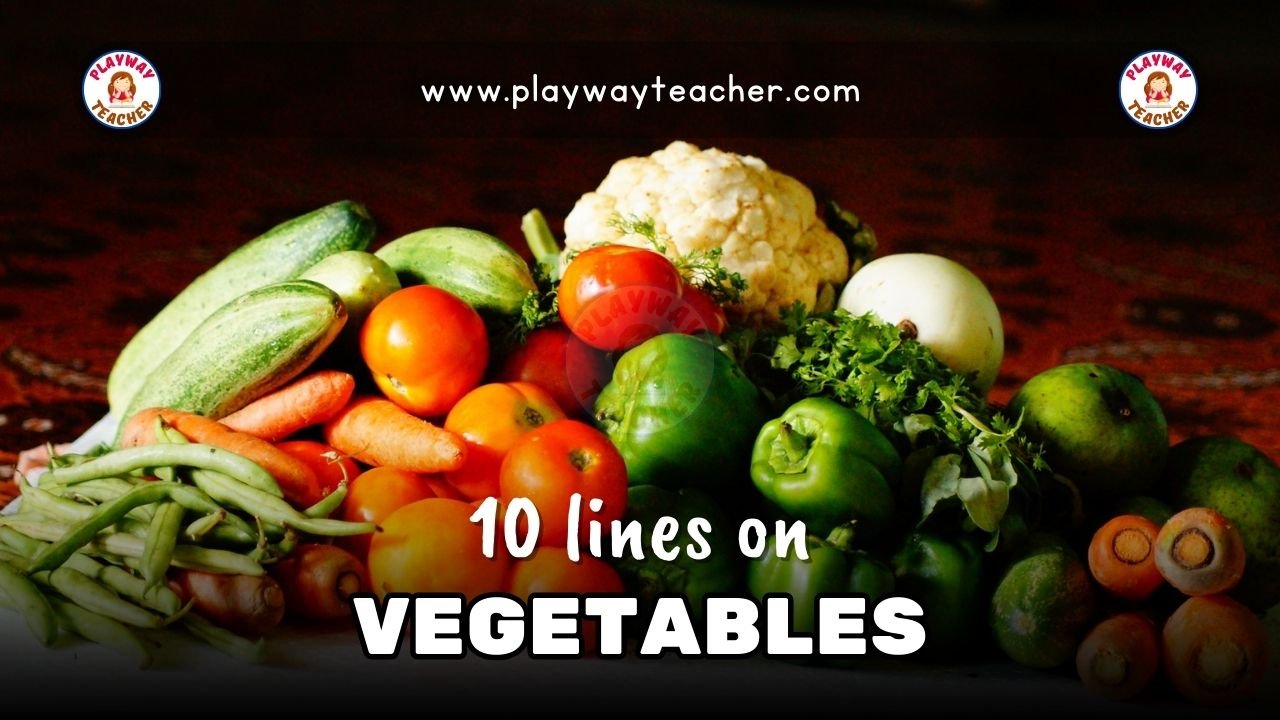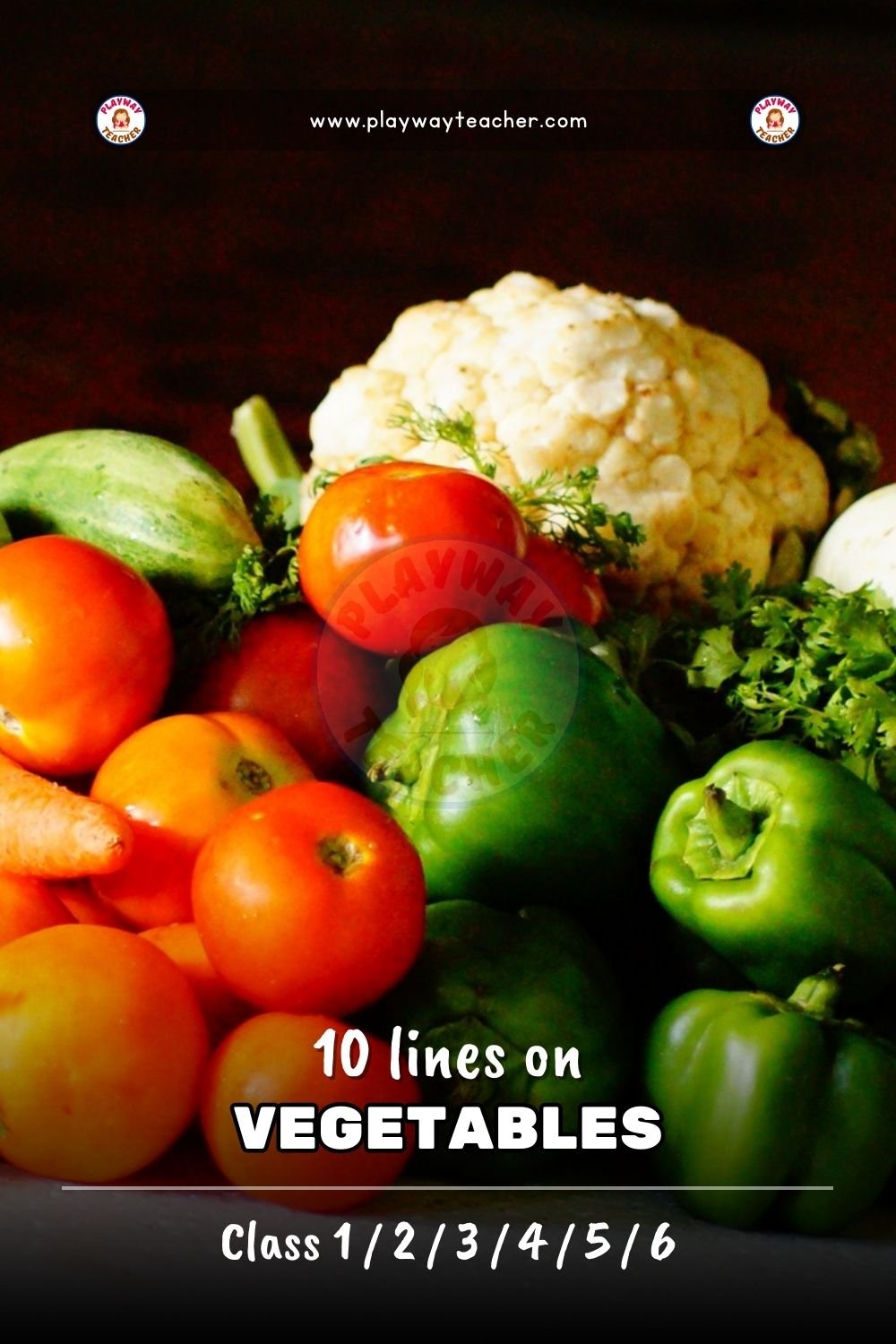
Contents
- Introduction to Vegetables
- Quick Facts About Vegetables
- 10 Lines on Vegetables for Class 1
- 10 Lines on Vegetables for Class 2
- 10 Lines on Vegetables for Class 3
- Compare: Root vs Leafy Vegetables
- 10 Lines on Vegetables for Class 4
- 10 Lines on Vegetables for Class 5
- 10 Lines on Vegetables for Class 6
- Final Thoughts
- Frequently Asked Questions
Introduction to Vegetables
These 10 lines on vegetables are designed to teach young learners about the importance of healthy eating habits. According to the guidelines set by NIPUN Bharat, understanding nutrition at an early age helps students make better dietary choices. We have crafted these simple sentences to enhance vocabulary and general knowledge for school oral tests.
Vegetables are an essential part of our daily diet, providing the vitamins and minerals needed for growth. For students of CBSE, ICSE, and State Boards, memorizing short points about different types of veggies is a common academic activity. You can explore more resources like 10 lines on various topics to help your child prepare for their exams efficiently.

Quick Facts About Vegetables
Pumpkin
Potato / Brinjal
Carrot
Beetroot

10 Lines on Vegetables for Class 1
These simple sentences introduce common vegetables to young kids. They focus on color and basic taste.
- Vegetables are healthy food for us.
- We should eat them every day.
- Carrots are orange and tasty.
- Spinach is a green leafy vegetable.
- Potatoes grow under the ground.
- Tomatoes are soft and red in color.
- Vegetables give us energy to play.
- My mother cooks yummy peas.
- We wash them before eating.
- I like to eat fresh salad.
10 Lines on Vegetables for Class 2
In this section, students learn about where vegetables come from and why they are good for strength.
- Vegetables come from plants grown in gardens or farms.
- Farmers work hard to grow fresh vegetables for us.
- We buy different vegetables from the market.
- Some vegetables like cucumber can be eaten raw.
- Brinjal is purple and has a green crown.
- Eating vegetables makes our body strong.
- Pumpkin is a very large and round vegetable.
- Onions add a nice flavor to our food.
- We should not eat too much fried food.
- Green vegetables are good for our eyes.
Get experienced home tutors for EVS and Science in Uttam Nagar, Vikaspuri, Dwarka & Janakpuri.
10 Lines on Vegetables for Class 3
Class 3 students can understand the health benefits of different vegetables. These lines mention vitamins and protection from illness.
- Vegetables are an important source of natural food.
- They help in the proper digestion of our meals.
- Green leafy vegetables are rich in iron and calcium.
- Eating them daily gives us essential vitamins.
- Vegetables help to protect us from falling sick.
- Bitter gourd is bitter in taste but very healthy.
- We should wash vegetables to remove dirt and germs.
- Many minerals are found in fresh produce.
- Soup made from mixed vegetables is tasty and warm.
- We must not waste vegetables on our plate.
Compare: Root vs Leafy Vegetables
| Root Vegetables | Leafy Vegetables |
|---|---|
| Grow underground. | Grow above ground. |
| Usually round or long shape. | Have flat green leaves. |
| Example: Potato, Carrot. | Example: Spinach, Cabbage. |
| High in carbohydrates. | High in iron and fiber. |
| Store energy for the plant. | Make food for the plant. |
| Have a firm texture. | Have a soft texture. |
| Need to be washed well. | Need careful cleaning. |
| Can stay fresh longer. | Spoil quickly if kept out. |
| Often cooked before eating. | Can be eaten raw or cooked. |
| Absorb water from soil. | Absorb sunlight. |
10 Lines on Vegetables for Class 4
In Class 4, students learn about the classification of vegetables and their role in a balanced diet.
- Vegetables are classified into roots, stems, leaves, and fruits.
- They provide dietary fibre which prevents constipation.
- Regular consumption of veggies builds our immunity.
- Some vegetables like ginger are used as medicine.
- We get essential nutrients without eating too much fat.
- Home-cooked vegetable curry is healthy and delicious.
- Seasonal vegetables are fresher than frozen ones.
- Radish and turnip are examples of edible roots.
- Using natural manure helps grow better quality crops.
- A balanced diet must include a portion of vegetables.
Personalized home tuition available for Class 1 to 12 in Uttam Nagar, Vikaspuri, Dwarka & Janakpuri.
10 Lines on Vegetables for Class 5
These lines cover agricultural aspects and the broader importance of vegetables in our ecosystem.
- Vegetables are an integral part of sustainable agriculture.
- They provide essential antioxidants that fight diseases in our body.
- Many people prefer organic vegetables to avoid harmful chemicals.
- India is one of the largest producers of vegetables globally.
- The cultivation of crops depends on the type of soil available.
- Farmers wait for the right season to harvest their produce.
- Legumes like beans and peas help improve soil quality.
- We should include a large variety of plants in our diet.
- Vegetable skins are often rich in fiber and vitamins.
- Eating locally grown food supports our local farmers.
10 Lines on Vegetables for Class 6
Class 6 content includes scientific terms like photosynthesis and metabolism, suitable for senior students.
- Plants produce vegetables through the process of photosynthesis.
- They are excellent sources of antioxidants which prevent cell damage.
- A diet high in vegetables helps lower bad cholesterol levels.
- The fibre content in vegetables aids in boosting metabolism.
- Botanically, many vegetables like tomatoes are actually fruits.
- Animals that eat only plant matter are called herbivorous.
- Hydroponics is a modern method of growing plants without soil.
- Maintaining a balanced ecosystem requires diverse plant life.
- Excessive consumption of processed food should be replaced with fresh greens.
- Vegetables have been a staple food for humans for thousands of years.
Final Thoughts
Understanding the value of healthy food habits is crucial for every student. These 10 lines on vegetables aim to encourage children to include more leafy greens and root vegetables in their meals. By learning about the benefits of a balanced diet, students can make smarter choices for their well-being. You can also explore our section on essays for students to find more such informative content.
We hope this guide helps you in your school projects and oral exams. Eating nutritious food is the first step towards a happy life.
What is your favorite vegetable and why? Leave a comment below and let us know!
Fact-Checked


Frequently Asked Questions
Was this helpful?
0 / 0

Playway Teacher simplifies school topics into easy, exam-ready notes. Curated by a former school teacher and active tutor with 15+ years of experience, our content is designed to help primary and middle school learners excel.
